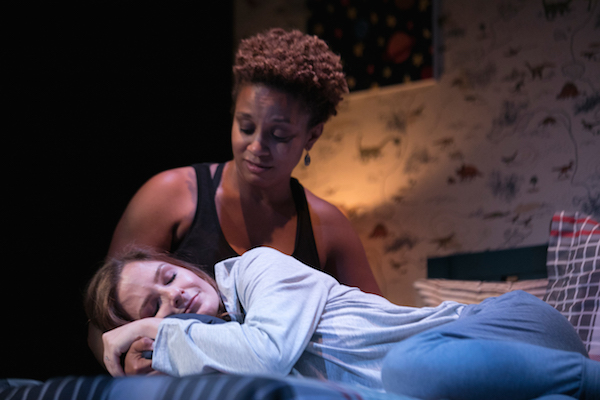To bake or not to bake. That is the question explored in Bekah Brunstetter’s timely and poignant play The Cake playing now through October 21st at the Geffen Playhouse. Brunstetter’s play was inspired by the now infamous case of the Colorado baker who refused to bake a cake for a gay couple’s wedding. The case went all the way to the Supreme Court, sending shockwaves through the LGBTQ community with seven justices ruling in the baker’s favor and two dissenting. Since then, similar cases have arisen in other states, proving this is not an isolated incident. The phenomenon is symptomatic of the great divide between the so-called liberal elite and evangelicals. Brunstetter has taken this cultural flashpoint and created a play which deftly explores what has become a national debate in a way that’s thoroughly engaging, funny, heartfelt and heartbreaking. The intimate 120-seat theater at the Geffen provides the ideal venue to evoke the small-town comforts of a quaint bakery in Winston-Salem, North Carolina, a stand-in for Anytown, USA. Debra Jo Rupp evokes southern charm and grit as Della, the spunky, sweet-as-pie proprietor of “Della’s Sweets” who extolls the virtues of baking the old-fashioned way – with none of the “healthy” substitutes like nut milks, sugar substitutes or organics. She believes in following the instructions without deviation, the way God intended. Della’s strict adherence to following the instructions forms the crux of this modern day morality play.
Della is brimming with excitement because she is under consideration to be a contestant on her favorite reality show competition, the Great American Baking Show. The reality show’s charismatic host George (who is heard but never seen) speaks to Della periodically throughout the play as a counterpoint to the narrative throughline. It’s an entertaining framing device and it also gives us some insight into Della’s subconscious as the vignettes blur the line between reality and fantasy. The first indication that Della’s carefully ordered world is about to change begins when a young African American writer from Brooklyn named Macy (Carolyn Ratteray) stops by the bakery. Macy has blonde highlights in her close-cropped ‘fro and is dressed in work boots and hipster butch attire. She and Della are a study in contrasts, both visually and ideologically. At this point, it’s not completely clear why gluten-free Macy is here, since she demonizes sugar as much as Della glorifies it. It isn’t until Macy’s fiancée Jen arrives (played by Shannon Lucio) that the full scope of the conflict starts to come into focus. Jen has returned to her hometown to marry Macy. This bakery carries special meaning for Jen because her mother (now deceased) was dear friends with Della, who has no clue that Jen is a lesbian.
Della is ecstatic to see Jen after all these years. When she learns that Jen is getting married, Della is thrilled for her and clearly onboard to bake the cake for her wedding. That is, until Jen breaks the news that Macy is her fiancée. And in that instant, everything changes. The life drains from Della’s face as she scrambles to find a way out of her commitment. Jen gives her an out, and Della takes it, suddenly noticing that she’s got a lot of orders and doesn’t want to spread herself too thin even though the wedding is six months away and everyone is perfectly aware of the real reason she had a sudden change of heart.
Over the remainder of the play, Della wrestles with her long held convictions and her guilt over turning her back on Jen. That night, Della breaks the news to her husband, Tim (Rod McLachlan), a solid blue-collar plumber whose religious beliefs are in lock-step with his wife. He tries to reassure Della that she’s done the right thing. But by this point, Della’s not so sure. In what seems like a reversal, Della says she hasn’t completely made up her mind one way or the other. She holds onto a sliver of ambivalence. And in that ambivalence, the playwright dangles the possibility of Della’s redemption.

What Brunstetter has done so effectively is create characters with such specificity that they never seem like mouthpieces for the Christian right or the liberal elite. They are flawed, complicated people. And that’s what allows us (whichever side of the divide we occupy) to understand the other side without generalizing or demonizing. This is particularly true when Della has something of a breakthrough in the bakery after a heated argument with Macy. Without giving away too much, I’ll just say that Della uses cake batter in some creative ways to reignite a spark in her long-dormant sex life with her repressed husband. It’s her “Doll’s House” moment. And it shows Brunstetter’s range as a dynamic writer who can traverse comedy and pathos with equal facility. Brunstetter also builds a credible wedge into Jen and Macy’s relationship which prevents it from becoming a stereotypical representation. Though she’s reluctant to fully acknowledge it, Jen has internalized her family’s provincial attitudes about sex. She admits she’s not always fully comfortable in the lesbian-centric neighborhood they’ve planted themselves in Brooklyn. Jen was looking to Della for her mother’s posthumous blessing. But Della isn’t able to tell Jen what she desperately wants to hear. It’s a tough, unflinching moment that doesn’t pander. After some contentious arguments with Macy, Jen is finally able to bare her soul to Della and own her sexuality. Macy exacts her own revenge by penning an article exposing Della. In this age of social media, the outrage is immediate and the repercussions are swift. But life goes on. Macy and Jen have their wedding… and their cake. Della even finds a way to square her religious convictions with her compassion for a relationship she may not fully embrace. The play avoids tidy endings and pat resolutions, but finds a way for each side to take tentative steps toward incremental understanding.
